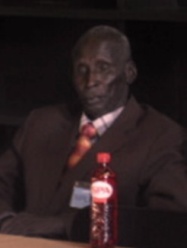Parties close arguments at Hague over oil-rich Abyei region
April 23, 2009 (THE HAGUE) – Debate ended Thursday in the arbitration case over the disputed Abyei region after heated exchange in which lawyers presented widely different interpretations of the evidence and treaty at issue.
 Lawyers for the Sudan People’s Liberation Movement on the one hand, and the Government of Sudan on the other, presented witnesses and other evidence Tuesday and Wednesday on the delimitation of the boundary for the region, with vast areas being contested between the two claimants.
Lawyers for the Sudan People’s Liberation Movement on the one hand, and the Government of Sudan on the other, presented witnesses and other evidence Tuesday and Wednesday on the delimitation of the boundary for the region, with vast areas being contested between the two claimants.
The five-member tribunal will make a decision within 90 days, either to validate the Abyei Boundary Commission (ABC) whose ruling had been rejected by the Government of Sudan, or reject the ABC for exceeding its mandate, and hence delimit a new boundary.
“We have every confidence in them,” Minister for Presidential Affairs Luka Biong Deng (SPLM) said of the judges, in a phone interview Wednesday with Sudan Tribune.
Earlier sessions from Sunday to Monday had addressed the crucial issue: whether or not the ABC — a body constituted in accordance with the 2005 peace treaty between SPLM and the government — exceeded its mandate.
“The underlying issue is whether the arbitral tribunal (the ABC) exceeded or failed to exercise the authority that the parties granted to it,” said Alain Pellet, representing the Government of Sudan during the concluding session today.
The authority of the ABC stemmed from the Abyei Protocol of the Comprehensive Peace Agreement (CPA), which envisioned that those people living within the boundaries of the demarcated area would be permitted a special referendum on whether to join the South or remain part of the Republic of Sudan.
Minister Luka Biong noted that the arbitration itself was “a recognition that we have failed to implement the very agreement that we signed; a recognition that as Sudanese we have failed to find even a mechanism to implement the provisions of the CPA; a recognition that we can not actually provide justice and peace to our people.”
Government witnesses included inhabitants of the region and written testimony from Second Vice President Taha. SPLM likewise called local witnesses, historian Martin Daly and experts on boundaries, among others.
Luka Biong said that the second phase of the hearings allowed SPLM “to put a human face to its argument.”
After the session Tuesday, Kuol Deng Kuol, Paramount Chief of the Nine Ngok Dinka Chiefdoms stated, “Today, we heard the Government continue to make the inconceivable argument that the Ngok Dinka were all located below the River Kiir in 1905. We are happy that our counsel now has the opportunity to describe the lands, culture, and history of our people, as well as our relationship with the Misseriya and others who have always been welcome in our lands.”
Ultimately, if the tribunal chooses to validate the boundary report of the ABC experts, then it will not have to demarcate anything itself. This clearly was the rhetorical aim of Gary Born’s final presentation to the judges.
Born characterized the whole ABC process as “a striking example of how internal dispute resolution should work,” also recalling that at no point during the ABC process had the government objected to the composition of the panel of experts nor to their work, and had solemnly committed to abide by their determination.
The lawyer, whose work elicited considerable satisfaction from Luka Biong, lauded the ABC experts for producing “an impressive report,” which “deserves our respect and our honour.”
To the contrary, Pellet belittled the ABC report for the manner in which it divided the Abyei area’s vast, disputed grasslands where nomads had allegedly exercised either primary, secondary, or equal rights to grazing, water points and transit routes. He criticized the experts for making a “pseudo-legal decision” based on fabricated principles of equitable distribution of secondary rights.
In his final speech, Pellet observed that “the parties’ respective positions remain as remote to each other as they did at the beginning – maybe more after Mr. Bourne’s last two speeches.”
But despite the government’s many criticisms of the ABC report, Born argued that their arguments were not only substantively false, but that they did not amount to the excess of mandate charge required to overturn the report. He noted that “annulment is to be distinguished from appeal,” telling the judges that the “the deference that you owe to the experts is high, extraordinarily high with regard to the demarcation.”
Failure to uphold the ABC decision, said the litigator, would jeopardize the rule of law in future cases, dissuading parties from resolving their disputes through peaceful means because they would know the decision could very probably not be implemented.
At the close of the session, Ambassador Dirdeiry Mohamed Ahmed for the government and SPLM Deputy Chairman Riak Machar thanked the tribunal.
Machar said, “The SPLM/A wants to affirm to this Tribunal its commitment to implement your decision and hopes that the Government of Sudan will also honor its commitment to implement your final award.”
(ST)
